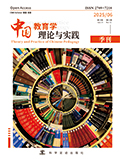

“聊斋先生”蒲松龄以塾师为终身职业, 他将相关的生命体验融入创作当中, 其作品也成为了底层学子科举和谋生状况的真实写照。蒲松龄的塾师生涯兼具谋生、备考与教育实践三重属性, 其作品中的“哭穷”叙事与教育书写, 既折射寒门士子因科举沉浮被迫于塾馆执教的无奈, 也暗含对师道尊严不存的讽刺。明清乡村塾师群体虽然普遍陷入了职业地位下降与经济困顿的困境, 但他们也会通过道德劝惩、文化传播和社会教化等方式, 成为地方治理的重要力量。从蒲松龄的个体经验切入, 有利于揭示科举制下乡村塾师的职业复杂性及其生存状态, 探讨传统教育体系下寒门士子的理想与现实处境的深刻张力。
“Mr. Liaozhai”, Pu Songling' s lifelong career was as a rural private teacher. He integrated relevant life experiences into his creations, and his works have become a true portrayal of the imperial examination and livelihood situation of lower class students. . Pu Songling’s career as a rural private teacher was characterized by three attributes: livelihood, exam preparation, and educational practice. The narrative of "crying for poverty" and educational writing in his works not only reflect the helplessness of poor scholars who were forced to teach in private schools due to the ups and downs of the imperial examination system, but also imply a satire on the lack of dignity in teaching. Under the pressures of the imperial examination system, the group of village schoolteachers during the Ming and Qing dynasties generally faced declining professional status and economic hardship. Nevertheless, through moral guidance, cultural dissemination, and social education, they became an important force in local governance. Examining Pu Songling’s individual experience helps unveil the complexity of the village schoolteacher profession under the imperial examination system and the profound tension between the professional aspirations of lower-class scholars and their harsh realities within traditional educational frameworks.